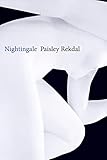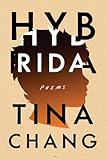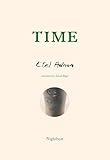Here are six notable books of poetry publishing in May.
Nightingale by Paisley Rekdal
Take a poem from Nightingale, and you have the whole book. This is meant to be an expansive, not reductive, observation—Rekdal’s poems have lush contours and routes without becoming labyrinthine; she offers questions in her narratives that are less conversational than illuminating. Take the grace and control of “Psalm,” the first poem in the collection. “Too soon, perhaps, for fruit”—the pause of the central word in that first sentence is like a sigh, the announcement that we must listen to the story about to be told. The narrator’s neighbor, despite the “ice-sheathed” branches, “waits, with her ladder and sack, for something to break.” She longs for growth, life: a gift. “So much abundance,” Rekdal writes, “and the only cost / waiting.” The narrator, present but not omnipresent (what control it takes to be there without being overbearing!), watches: “I almost expect the sound of bells, / a stone church, sheep in flocks.” This grand tree seems like it deserves a cathedral, some rapt congregation; instead, “it is on a common / lot, beside a road, apartment buildings, a dog / sleeping in its yard.” I love when a poet lingers, patiently, perceptively, because if the lines are authentic enough, then maybe we’ll do the same. Rekdal, the poet laureate of Utah, is skilled enough to ask careful questions: “Who planted this tree? / How long has it stood here? How many more years / can such a thing remain?” The tree almost sounds impossible, and the narrator knows “the fruit is real. I have eaten it.” She has “spooned it / over bread and meat. I have sucked it / from my husband’s fingers.” Nightingale is one of the best books of the year: a tale of transformation and tragedy, arriving in poems a bit longer than other poets might dare—there’s a patience and persistence here. Take the enigmatic “Four Marys,” a meditation on Piero della Francesca’s Madonna del Parto (1460): “Are the drapes drawn open or being closed?” This is everything that ekphrastic poetry can be: “And even if I didn’t believe / the child would rise again, I would believe the artist.” A poem-essay midway through the collection, “Nightingale: A Gloss,” is alone worth the collection’s weight, but I hope readers are grateful for this entire book.
Hybrida by Tina Chang
“It feels like grace,” poet Tina Chang has said about her pregnancy. “Mercy. Deep down in darkness, I uncover it. Those spirits underground shake until I hold to the wall to keep still.” Her son was her past made present, “a strangeness of the future. The idea of a child is something so unreal, it can only be manifested by human hands. It’s like a ghost rummaging in your mind that says, Go ahead, imagine it.” Hybrida, the newest collection from Brooklyn’s poet laureate, is a beautiful meditation of home and hope and hurt. “In every definition of home, my son conjures / milk,” she writes: “In every memory / I have of him, his hands are outstretched / and he is asking for his last bottle.” She thinks of her son when she hears the news of Leiby Kletzky, a young boy killed; how his mother felt waiting for him, his life forever a story unfinished. Chang holds her son close: “I’m afraid of the world.” She tells him stories at home, a “place so safe,” where together they “are weightless, buoyant in its murky sweetness.” There’s an earned gentleness to these lines—call them inspirational (imagine it: a poem can make us love each other better!). Hybrida is a song of love, and creation myths; or perhaps they are our creation truths. From “Patience”: “I come from that too, from the indifference / of doors and keys, from the sonnet of the sewing machine / which wrestled my neck at the collar and all my words / caught at the throat, struggled to make one stitch, a straight line.” Chang’s talent in capturing how our past breathes in our present makes for poems that feel birthed over years. Her lines are realistic, cautious, and yet ultimately optimistic: “The future is an animal / waiting to pounce. It is that bestial. That patient.”
Is, Is Not by Tess Gallagher
Tess Gallagher has described her poetry as an abiding, yet imperfect, spirituality—the feeling of “reaching” for some presence, and while she might feel unfulfilled, that “reaching is a grace, too, even when I don’t feel answered.” Gallagher writes of the dead and their heavy weight of memory, as with “In the Company of Flowers,” where, “as I dug into earth of my mother / who, when my youngest brother / died, was taken in / by beauty, not as consolation / but because she found him / there as she made the garden.” Her mode of elegy is one of transcendence, and it extends to even the changed lives of the living. “What does it say / that the only shoe repairman in town / has retired?” She “admired your Lazarus / revivals” because “it’s feet in failing shoes / that rule the world.” Is, Is Not is worth our attention for these pauses, as with the heartbreaking short poem, “Opening”: “I entered this world not wanting / to come. I’ll leave it not / wanting to go. All this while, / when it seemed there were two doors, / there was only one—this / passing through.”
Lima :: Limón by Natalie Scenters-Zapico
 “I want you / to say my name like the word: lemon. / Say it like the word: limón. Undress me / in strands of rind.” Scenters-Zapico’s narrators are commanding, absolutely present, mystically intoxicating—each poem feels like a skillfully-recreated dream. She begins the collection with lines from Conchita Piquer’s song that serves as title and inspiration for the collection: “Que penita y que dolor, / La vecinita de enfrente soltera se quedó” (“What pain & what shame, / The little neighbor girl from in front ended up single.”). Lima :: Limón plays on that sharp tension between shame and sexuality, a tension Scenters-Zapico offers in several different incarnations. From “In the Age of Los Zetas”: “Men who only value // a woman for her extra rib, / that holy thing that breaks / & heals without a cast.” Juxtaposed on the next page with “Lima Limón :: Azahar”: “I lie on my back in the grass & let the weight / of a man on top of me. Out of breath, he searches / for a place on my body that hasn’t flooded.” Bodies abound: shamed, worked, desirous, preternaturally attracted to mouths (“Stop writing // about the mouth: the tongue, the holy / molars, the wear of grinding yourself / to bone. Stop writing about the mouth: / his mouth, your mouth, her mouth.”). At first, we might want to label Scenters-Zapico’s style surreal, but her palpable detail and narratives are better described as hyper-real. Lima :: Limón builds toward a confession of sorts, but whose penance is poetry: “My sins: / so many I lie in losing count.”
“I want you / to say my name like the word: lemon. / Say it like the word: limón. Undress me / in strands of rind.” Scenters-Zapico’s narrators are commanding, absolutely present, mystically intoxicating—each poem feels like a skillfully-recreated dream. She begins the collection with lines from Conchita Piquer’s song that serves as title and inspiration for the collection: “Que penita y que dolor, / La vecinita de enfrente soltera se quedó” (“What pain & what shame, / The little neighbor girl from in front ended up single.”). Lima :: Limón plays on that sharp tension between shame and sexuality, a tension Scenters-Zapico offers in several different incarnations. From “In the Age of Los Zetas”: “Men who only value // a woman for her extra rib, / that holy thing that breaks / & heals without a cast.” Juxtaposed on the next page with “Lima Limón :: Azahar”: “I lie on my back in the grass & let the weight / of a man on top of me. Out of breath, he searches / for a place on my body that hasn’t flooded.” Bodies abound: shamed, worked, desirous, preternaturally attracted to mouths (“Stop writing // about the mouth: the tongue, the holy / molars, the wear of grinding yourself / to bone. Stop writing about the mouth: / his mouth, your mouth, her mouth.”). At first, we might want to label Scenters-Zapico’s style surreal, but her palpable detail and narratives are better described as hyper-real. Lima :: Limón builds toward a confession of sorts, but whose penance is poetry: “My sins: / so many I lie in losing count.”
Time by Etel Adnan (translated by Sarah Riggs)
Adnan can’t help but paint, write, and breathe in philosophy, and we are all the better for it. Born in 1925 in Beirut, she attended Catholic schools—“we had religion around all the time”—but she was a “dissident without effort.” Uninterested in neither the catechism nor the lives of the saints, Adnan was compelled by how the nuns spoke “of revelation, even the word itself,” creating for her sense of light as our profound “definition of life.” Time feels charged by this revelatory sense. The book contains epigrammatic pieces written between 2003 and 2010, and started from a postcard she’d received by the Tunisian poet Khaled Najar. The postcard as medium and space is the perfect vessel for her poems. Her first sequence, dated when she received the note from Najar, ends powerfully: “streets lead to / illuminations, but never to peace / of the heart // watch your brothers die / on TV, and don’t move. / they are in a new world / although with no exit.” Although occasionally tagged by dates and times, the poems in this book feel eternal. “I love the rain when it / wraps me like a / river,” Adnan writes, “grafts me to the clouds. / I share in the properties / of the sky. I grow / like a tree.” A moving book of war: “We have cried enough / to wash your / body / but that body was dead.”
Some Unimaginable Animal by David Ebenbach
A funny, tender, inviting collection, whose traits come from Ebenbach’s gifts of storytelling. In “Ghost Stories,” Ebenbach begins: “I’m going to write a Jewish one, a ghost story / without equilibrium. Because let’s face it: / most of those tales believe in a God who keeps / a tally.” Those traditional ghost tales are balanced: punishment metered to sin, no sense of surprise. “So in my story,” the narrator explains, “there will be the haunting of the innocent. Floorboards will creak their way / to people just eating breakfast.” He ends the poem: “The lights tremble, / but in your house, too.” I like that second-person gesture at the end; it is a nudge, a whisper, an invitation. “This year we spangle the place, the door / wrapped like something we’re giving away” he starts “Hanukkah,” a poem in which not much happens other than the struggle with a faulty braid of lights. In the darkness, the collected family “let the candles / make their quiet points.” As in this poem, as well as “Passover this Year,” Ebenbach’s narratives are domestic sketches: unassuming, and yet spiritually revealing. This particular Passover is painted by snow: “So anyway we sit down together / at a table where everything’s renewal, / renewal, and under the table our boots / slush the floor and leave salt footprints.” Ebenbach takes us into his poems, and these are welcome journeys.
The post Must-Read Poetry: May 2019 appeared first on The Millions.
from The Millions http://bit.ly/2DKlkUX





Comments
Post a Comment